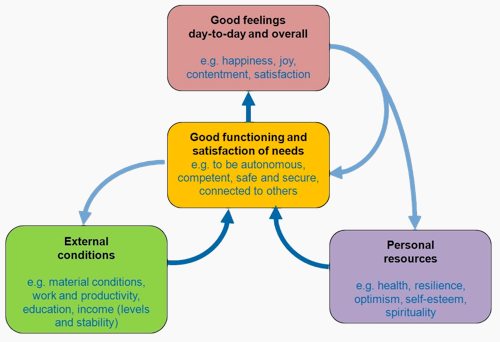Happiness At Work

At the World Congress of Positive Psychology (June 2013), Nic Marks, the founder of the Centre for Well-Being, an independent think tank at the New Economics Foundation (NEF), in London presented a workshop on Happiness Works! How to create happy high performing teams with an innovative tool.
Marks described happiness as a functional part of human emotions, playing an evolutionary role, just as fear does for us to fight or flight. He refered to a Gallup study of 140,000 employees in 11 organisations in 2010 which showed a causal link to happiness and the impact on performance and highlighted evidence of companies now delivering happiness as a path to profits.
Wharton School professor, Alex Edman’s study of the “100 Best Companies to Work for in America.” found that these companies between 1998 and 2005 returned 14% per year, compared to 6% a year for the overall market.
Hewitt Associates showed similar results in their report on employee engagement (including employee morale, confidence in the organisation, career opportunities, rewards and recognition programs and trust in leadership). Courtney Rubin describes the staggering results of this 900 organization study in her September 20, 2010 article in Inc. magazine. It turns out that organizations with high levels of employee engagement (>65%) outperformed the total stock market index and posted shareholder returns 19% higher than average in 2009. Furthermore, companies with disinterested employees (<40% engagement) had a 44% lower than average total shareholder return.
What actions can you take to improve happiness at work?
- Reconsider your staff surveys...
- 80% of staff in UK believe it makes no difference because the questions are wrong, the feedback is delayed and change implementation is not effective
- Consider a dynamic model of wellbeing as our happiness is not fixed or static. It is fluid and dynamic. How you feel is influenced by what you do (functioning),which in turn is dependent on both where you work (organizational system) and who you are (personal resources).

- Assessing your happiness is important for gaining insight around the actions for change and your priorities. You can then facilitate solutions and ideas for implementation
My recommendations are:
- Assess your own happiness at work. Try a free 10 minute survey that covers the key drivers of happiness at work. Get instant access to your results based on the latest well-being research. Free individual survey
- Develop your action plan. Ask yourself:
- What do I want to achieve? How do I want things to be different?
- What actions or ideas would help me to achieve my goals?
- What are the next steps? When will I take them?
Get happy!

